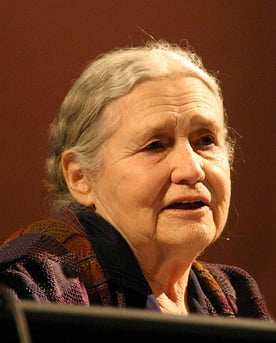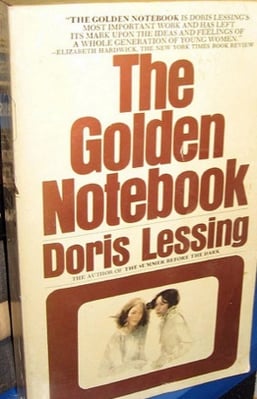Rarely can a work be called “unique” and truly earn that qualifier. The Golden Notebook is that unicorn in literature that is recognized as one of a kind, or as the Oxford Companion to English Literature terms it, "inner space fiction." It's a novel in four parts, (or is it one?) that reflect the narrator’s feelings about communism, and include a novel within a novel, a personal diary, and then the final depiction wherein the previous three become one, glorious, Golden Notebook. Each part is revisited, overlapping with one another, and the whole thing is a reading experience like no other.
 The author of this amazing tome is almost as interesting as her work. Born in 1919 in what is now known as Iran to British parents, Doris Lessing relocated to Zimbabwe at age 6 and until 13, she was educated in a convent. She became a parent during her marriage, but left both her husband and her two children in 1943 and remarried a member of the Communist Party with whom she had another child, Peter. She began writing and again divorced and relocated to London with her young son.
The author of this amazing tome is almost as interesting as her work. Born in 1919 in what is now known as Iran to British parents, Doris Lessing relocated to Zimbabwe at age 6 and until 13, she was educated in a convent. She became a parent during her marriage, but left both her husband and her two children in 1943 and remarried a member of the Communist Party with whom she had another child, Peter. She began writing and again divorced and relocated to London with her young son.
In 1962, The Golden Notebook was published and became a success, and she was established as a major literary voice. She went on to publish many other books and to win various awards and honors for her work, including the Nobel Prize in Literature in 2007. The Golden Notebook remains her crowning achievement and an iconic piece of writing for women of multiple generations.
The Golden Notebooks speaks about war, Stalin, communism, feminism, and sexuality. A volume this rich and eclectic has to be read both carefully and with some suspension of expectations for a traditional narrative. Those expecting a simple linear story will have to amend their expectations and give in to the unique and experimental form of this incredible book.
 The basic plot, as much as one can boil it down, is thus: The novel is a story within a story of Anna Wulf, who is a writer. She has written about her life in four separate notebooks, and the Golden Notebook is her attempt to tie all four together. She has a close friend, Molly, who is an actress, and through her life and Molly’s, Anna discusses their lives as women in regards to their experiences and families. The central narrative, entitled 'Free Women,' is then colored by excerpts from the notebooks, each with its own flavor and focus.
The basic plot, as much as one can boil it down, is thus: The novel is a story within a story of Anna Wulf, who is a writer. She has written about her life in four separate notebooks, and the Golden Notebook is her attempt to tie all four together. She has a close friend, Molly, who is an actress, and through her life and Molly’s, Anna discusses their lives as women in regards to their experiences and families. The central narrative, entitled 'Free Women,' is then colored by excerpts from the notebooks, each with its own flavor and focus.
Lessing’s intended focus and theme of the novel is fragmentation. The character of Anna suffers a mental breakdown, echoing the confusion and necessary compartmentalization of the notebook narrative. Anna has to parse herself and experiences out into different written works, and when trying to bring them together, she finds herself losing her mind. This is a direct illustration of what Lessing saw the role of women becoming as women found themselves trying to navigate life experience, politics, family, and personal feelings. In Lessing’s own words:
“This novel, then, is an attempt to break a form; to break certain forms of consciousness and go beyond them. While writing it, I found I did not believe some of the things I thought I believed: or rather, that I hold in my mind at the same time beliefs and ideas that are apparently contradictory. Why not? We are, after all, living in the middle of a whirlwind.”
This book is significant, not only to women, but to the culture as a whole. President Barack Obama has counted it as one on a list of books important to him, and it was honored by Time Magazine as one of the 100 best English-language novels since 1923. The book has spurned not only traditional criticism and discussion, but its own nonlinear experimental discussion. The Golden Notebook Project is an online close-reading wherein seven women read and annotate the text and converse with both the book and one another. The project was produced in 2008 and is still accessible to new readers and long time lovers of Lessing’s work.
Lessing never stopped writing and creating and is noted as the oldest winner of the Nobel Prize in Literature, receiving it at 88 years of age, and one of only a handful of women to be honored in this way by the Swedish Academy. Her lecture on winning, On Not Winning the Nobel Prize drew acclaim and attention and was published and raised money for children with HIV/AIDS. A year later she published her final book, Alfred and Emily. She passed away in 2013 at her home in London. She was 94 years old.
 The Golden Notebook. (2015, December 31). Retrieved March 31, 2016, here.
The Golden Notebook. (2015, December 31). Retrieved March 31, 2016, here. Doris Lessing, The Golden Notebook, United Kingdom, 1962, back cover.
The Golden Notebook. (2008). Retrieved March 31, 2016, here.
Wetzig, E. (n.d.). Doris Lessing. Retrieved March 31, 2016, from here. (Originally photographed 2010, December 30)








